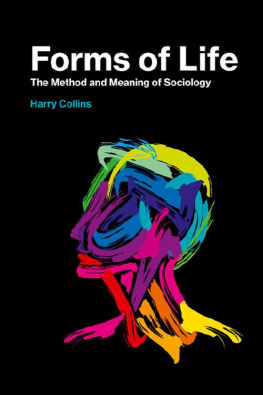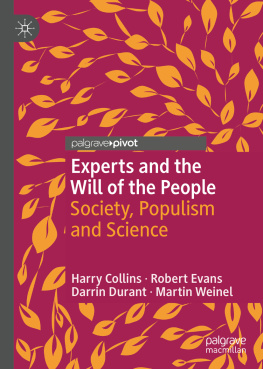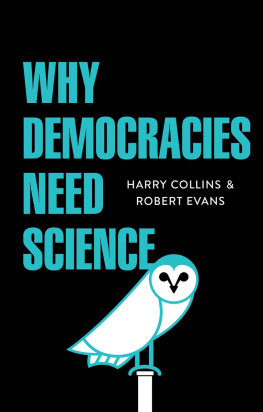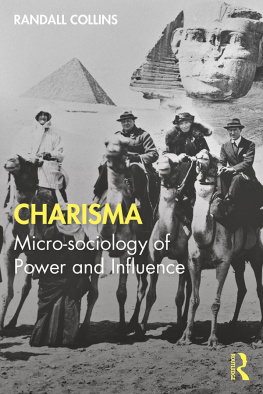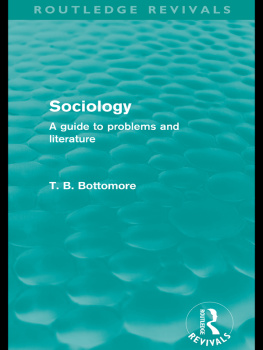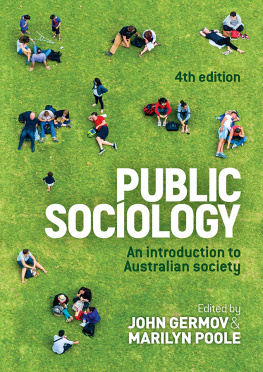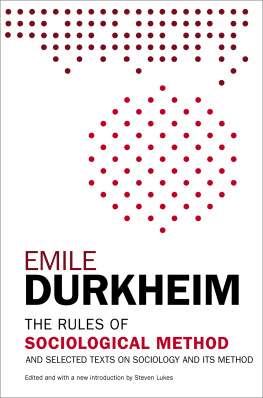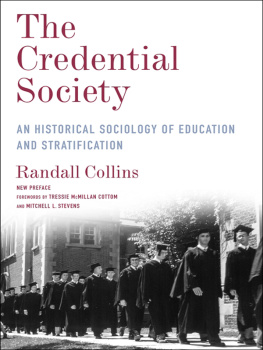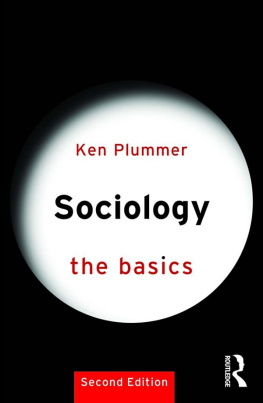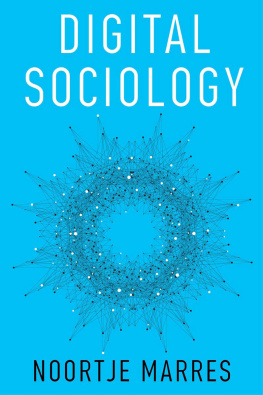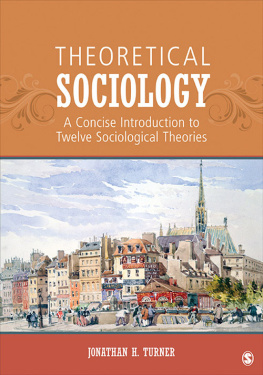Forms of Life
The Method and Meaning of Sociology
Harry Collins
The MIT Press
Cambridge, Massachusetts
London, England
2019 Massachusetts Institute of Technology
All rights reserved. No part of this book may be reproduced in any form by any electronic or mechanical means (including photocopying, recording, or information storage and retrieval) without permission in writing from the publisher.
This book was set in ITC Stone Sans Std and ITC Stone Serif Std by Toppan Best-set Premedia Limited. Printed and bound in the United States of America.
Library of Congress Cataloging-in-Publication Data
Names: Collins, H. M. (Harry M.), 1943 author.
Title: Forms of life : the method and meaning of sociology / Harry Collins.
Description: Cambridge, MA : The MIT Press, [2019] | Includes bibliographical references and index.
Identifiers: LCCN 2018026969 | ISBN 9780262536646 (pbk. : alk. paper)
eISBN 9780262351812
Subjects: LCSH: SociologyMethodology.
Classification: LCC HM511 .C6573 2019 | DDC 301.01dc23 LC record available at https://lccn.loc.gov/2018026969
ePub Version 1.0
d_r0
Table of Contents
List of tables
- Chapter 2
List of figures
- Chapter 1
- Chapter 3
- Chapter 5
- Chapter 6
- Chapter 7
- Chapter 9
Guide
Introduction
- Hints and Guidelines Extracted from Chapter 1
- Three activities make up the foundations of sociological method:
- Immersing oneself in society
- Estranging oneself from society
- Explaining what has been discovered to those who have not been immersed
- The meaning of science has changed since the 1970s.
- The fractal model is needed to understand social groups.
- Subjective methods can be scientific and stronger than objective methods.
- Even physics is based on subjective social judgments.
- Life depends on the sociological meta-expertise of knowing how far social groups extend.
- What stereotyping means.
- Our understanding of life is undersocialized, not oversocialized.
- We can use numbers to persuade as well as discover.
- Science is a handy domain for studying knowledge in general.
A Simple Approach
The number of social science methods texts and handbooks is large and growing. It must be daunting to students and professionals alike to face this torrent of writingsit certainly frightens me. But the principles of social science methods are simple and, I believe, timeless, in spite of the churn of sociological fashion. The lasting heart of sociology as a unique discipline with its own identity is the idea of the social. The starting point is Durkheim, along with the sociology of knowledge: humans are constituted by societies. From here, the methods can be worked out from first principles. That is what the book is about, but the discrete methodological hints and guidelines that can be pulled out of the discursive argument are listed at the head of each chapter. As the large literature on methods indicates, there are as many minor variants of social science advice as there are fieldwork situations; but we will look at the big picture, taking the lead from experience, that experience being based on the idea of sociology as a unique study of forms of life, or collectivities of human beings engaged in social life. There is no other science that studies social life as a basic constituent of the world.
The three elements of method that build on this foundation are:
- Learn to understand a social group by becoming a member of it.
- Accomplish estrangement from it and then reflect.
- Communicate the outcome persuasively to those who do not understand.
A crucial question concerns the depth of stage 1. My own studies range from total failure to understand anything to what we now call contributory expertiselearning enough to contribute to the domain being studied. In between, and the most important idea, is interactional expertise, which is about becoming fluent in the language of the domain. One of my studies, based on interactional expertise, has been going on for forty-five years to date. But socialization to the point of near-complete interactional expertise is beyond many researchers, while most student projects wont go further than a few interviews. But, as we will see, this is not fatal: the crucial thing is to know what one is trying to do, understand the compromises, and present the results honestly. Given this, solid results can be obtained with very few resources.
In my experience, one can work out what to do in practice using only a couple of ideas that grow out of the basic concept of sociology. I leaned heavily on one or two books: Peter Winchs The Idea of a Social Science, and, to a lesser extent, Peter Bergers Invitation to Sociology. Neither of these books is about the kind of methods found in methods textbooks; what they do is take a broad, philosophical view of the nature of social life. By starting with principles in this way, rather than with narrow recipes meant to fit preplanned fieldwork situations, one can work out how to proceed in real time given the inevitable unpredictability of fieldwork. The carefully executed field study that nicely follows the initial plan is a stranger to my research life. Nevertheless, there may be something to be learned from the extensive experience of someone like me: I try to show how to approach things, if not how to plan.
Since the major driver of this book is experience, and since experience has different lessons to teach at different stages of a research career, here and there the book has an autobiographical flavor. At the start of any career, one tends to be uncertain and short of resources; at the end, one is secure and, with luck, has time and money to do what one wants. At the start of my career, the sociological community was working in the benign political atmosphere of the 1960s and 70s; now we live under the malign threat of populism and its potential aftermath, and this changes the gaze. Many of the ideas presented here have already been published, and some, notably some of the gaze-changing ones, are in the process of being published, but pretty well every word has been written from scratch. The publications of mine that have made marked contributions to the chapters are indicated in appendix 2; thirty-five are listed, which gives an indication of the many ways experience has been used in the books arguments.
Scientific Sociology
In the 1960s in the UK, a widely used textbook written by the late Stephen Cotgrove proclaimed it was setting out the principles of scientific sociology.
But the situation is far from gloomy for the social sciences, even when they are thought of as genuine sciences. Here it will be argued that if the social sciences are properly understood, and their results soundly generated, their findings can be even more reliable than those of the physical sciences, even though some of these demand a 5-sigma, or 1-in-3.5 million, confidence level. So this book is a kind of new science of society, but with both the natural and social science looking very different from what Cotgrove had in mind.
Insofar as this book makes a contribution to the formalized methods literature it is meant to indicate what ought to change in the next generation of those very large and comprehensive methods texts. It is a strange thing that one of the most successful fields of social science over the last fifty years or so has been the social study of science, and yet the results have not been absorbed into the discipline as a whole. The idea of science that informs both the philosophy of social science and social science methods seems unchanged; they are still dealing with the problems I was made to study as an undergraduate. Admittedly, social science methods have moved a long way in the qualitative direction but, on the journey, the field has given up its claim to being a science. Here I argue that sociology is qualitative at its heart but, nonetheless, it should be proud to call itself a science because we now know much better what science means.
Next page
